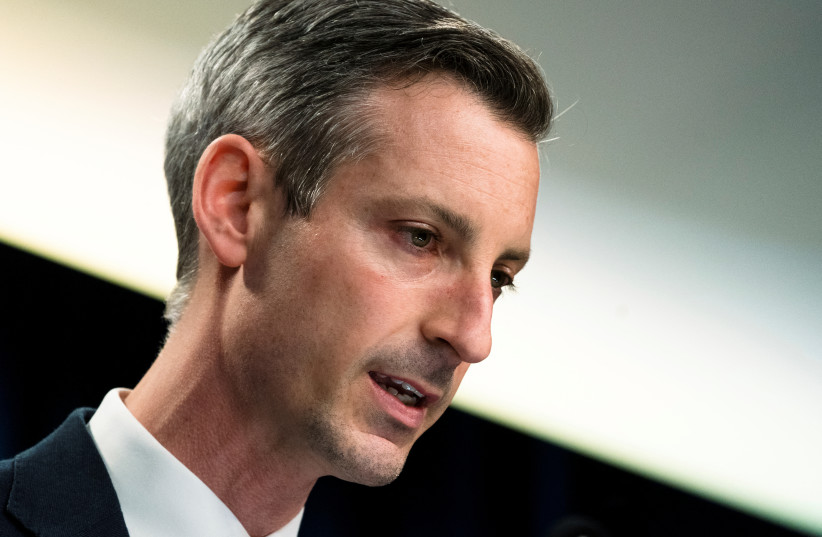WASHINGTON – Up until a month ago, the revival of the 2015 nuclear agreement with Iran, the Joint Comprehensive Plan of Action (JCPOA), was seen in Washington as a done deal.
The sides have made “significant progress,” and they were “close to a possible deal,” State Department spokesman Ned Price said in a press briefing. The Vienna negotiations “could amount to something close to the finish line,” he said in another briefing.
The reports of a possible deal sparked concern on Capitol Hill. A bipartisan group of 21 House members sent a letter to US President Joe Biden, expressing concern over the revival of the deal.
“Since the beginning of this administration, we have hoped that renewed negotiations with Iran would achieve a longer and stronger agreement than the JCPOA with clear nuclear restrictions and provisions addressing Iran’s international terror and missile programs,” they wrote.
“Among other issues, we are highly concerned about reports indicating the potential lifting of the Foreign Terrorist Organization designation of the Islamic Revolutionary Guard Corps and of the sanctions placed on members of the office of the supreme leader,” they added.

And indeed, the issue of delisting the IRGC remained at the heart of the disagreement between the countries. One month later, the fate of the agreement remains uncertain.
“We’ll see whether a deal can be achieved or not,” Senator Bob Menendez (D-New Jersey), chairman of the Senate Foreign Relations Committee, told The Jerusalem Post last week. “I’m not quite sure that it can, but lifting the designation of the IRGC is something that I would find really problematic.”
Much of the basic deal on a return to mutual compliance has been agreed to, although some small differences over certain sanctions-relief categories may still be open, a source familiar with the negotiations said.
“Recently, attention started to turn to the question about the Iranian demand of the IRGC being removed from the Foreign Terrorist Organizations list,” the source said. “And there’s no agreement on that point. Some ideas have been kicked around, but there’s no agreement.
“It’s not technically part of the JCPOA; it’s not part of a return to compliance. It’s sort of a parallel separate agreement – if there is going to be an agreement at all.”
The US had put some ideas out, but “Iran’s reaction wasn’t great,” the source said.
“They went back to Tehran; they didn’t come back to Vienna; they didn’t really answer,” the source added. “Then came their holiday, Nowruz; now it’s Ramadan. And so the European Union moderator has been going back and forth a bit to see if he could come up with some bridging proposals. But it’s a bit of a staring contest. Each side is waiting to see if the other one will blink and make some new offer.”
Dennis Ross is the counselor and William Davidson distinguished fellow at The Washington Institute for Near East Policy.
“It does seem that the main unresolved issue is the delisting of the IRGC,” he said. “Will it and other differences be overcome? The Iranians are likely to ratchet up the pressure, making clear they will push their nuclear program forward if there is no agreement.”
“The Iranians should understand that the Biden administration is unlikely to add to its concessions now, especially given [Russian President Vladimir] Putin’s war of aggression in Ukraine,” Ross said. “This is not the time to send a signal of weakness. If the Iranians want sanctions relief, they will have to find a way to reach an agreement. I have always felt the Iranians would determine if there would be a deal. I still think it is more likely than not, but time will tell.”
Dov Zakheim is a senior adviser at the Center for Strategic and International Studies.
“The delay may be due to Iran seeing that Ukraine would not have been attacked if it had retained its nuclear weapons,” he said.
Zakheim, former undersecretary of defense during the George W. Bush administration and former deputy undersecretary of defense for planning and resources during the Reagan administration, said there is congressional opposition to the deal even among leading Democrats.
“Also, Congress not only is unlikely to remove any sanctions that it voted on but might add new ones, forcing Biden to veto,” he said. “As the 2022 election approaches, a deal, especially if the IRGC comes off the terrorist list or if Biden vetoes new sanctions, would give the Republicans another stick with which to beat the Democrats since Iran remains hugely unpopular in the US. So both sides have reason to be wary of a deal. There may not be one after all.”
Richard Goldberg is a senior fellow at the Foundation for Defense of Democracies in Washington.
“What you’re seeing is a classic Iranian negotiating play to press the envelope and see what else they can get out of an administration desperate for a deal,” he said.
“The Biden administration has already agreed to lift terrorism sanctions on the Central Bank of Iran, the National Iranian Oil Company and hundreds more banks, companies, ministries and individuals – flooding the regime with billions of dollars to finance the IRGC,” Goldberg said. “The administration has likely already agreed to remove the IRGC from the Foreign Terrorist Organization list, and the negotiation now is over how to address the regime’s remaining objection to congressionally mandated Treasury sanctions on the IRGC being left in place.”
“We don’t know when a deal will be announced, but based on the negotiating posture of the Biden administration to date, there doesn’t seem to be any willingness to walk away from the table, so the Islamic Republic will eventually get whatever it wants,” he said.
